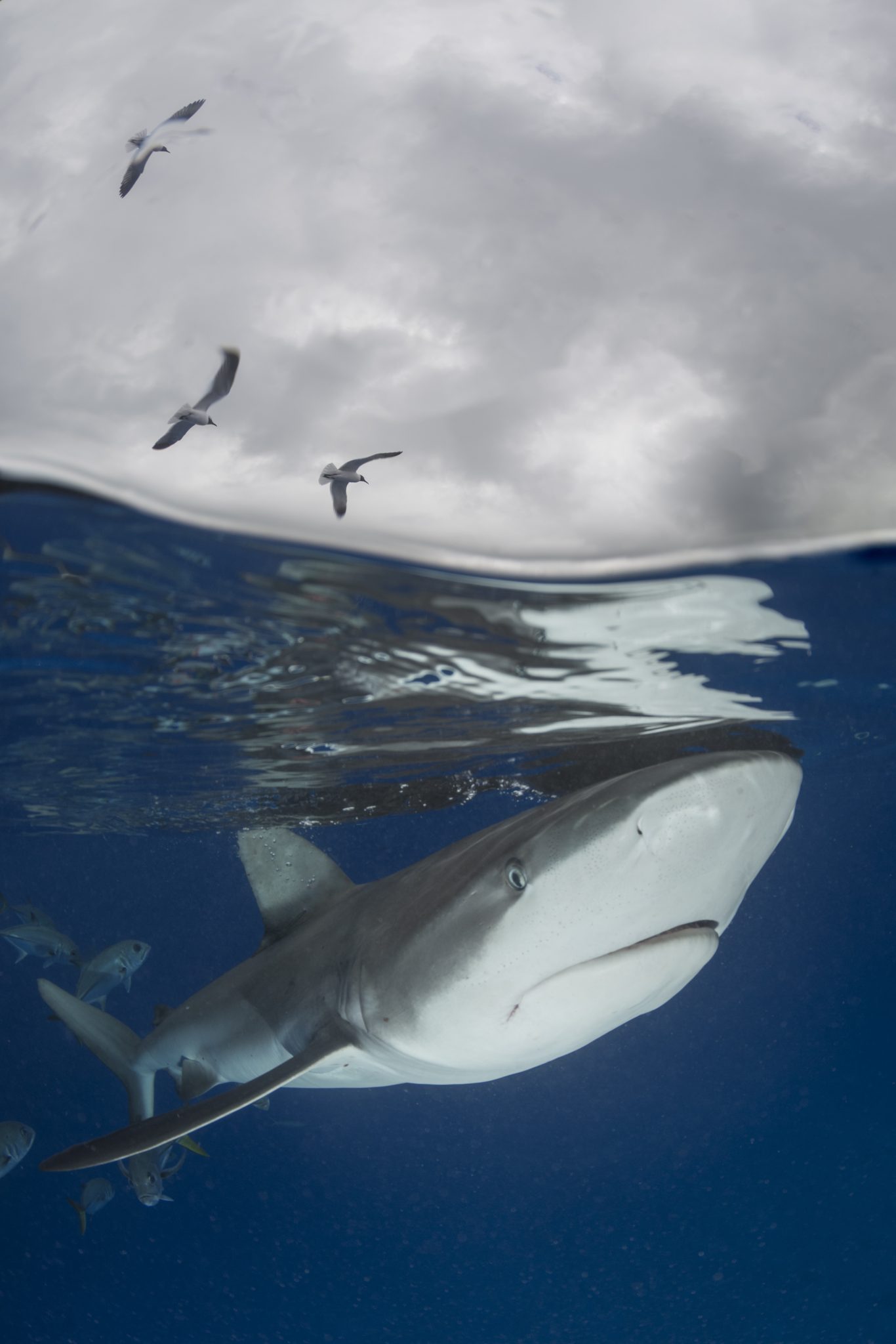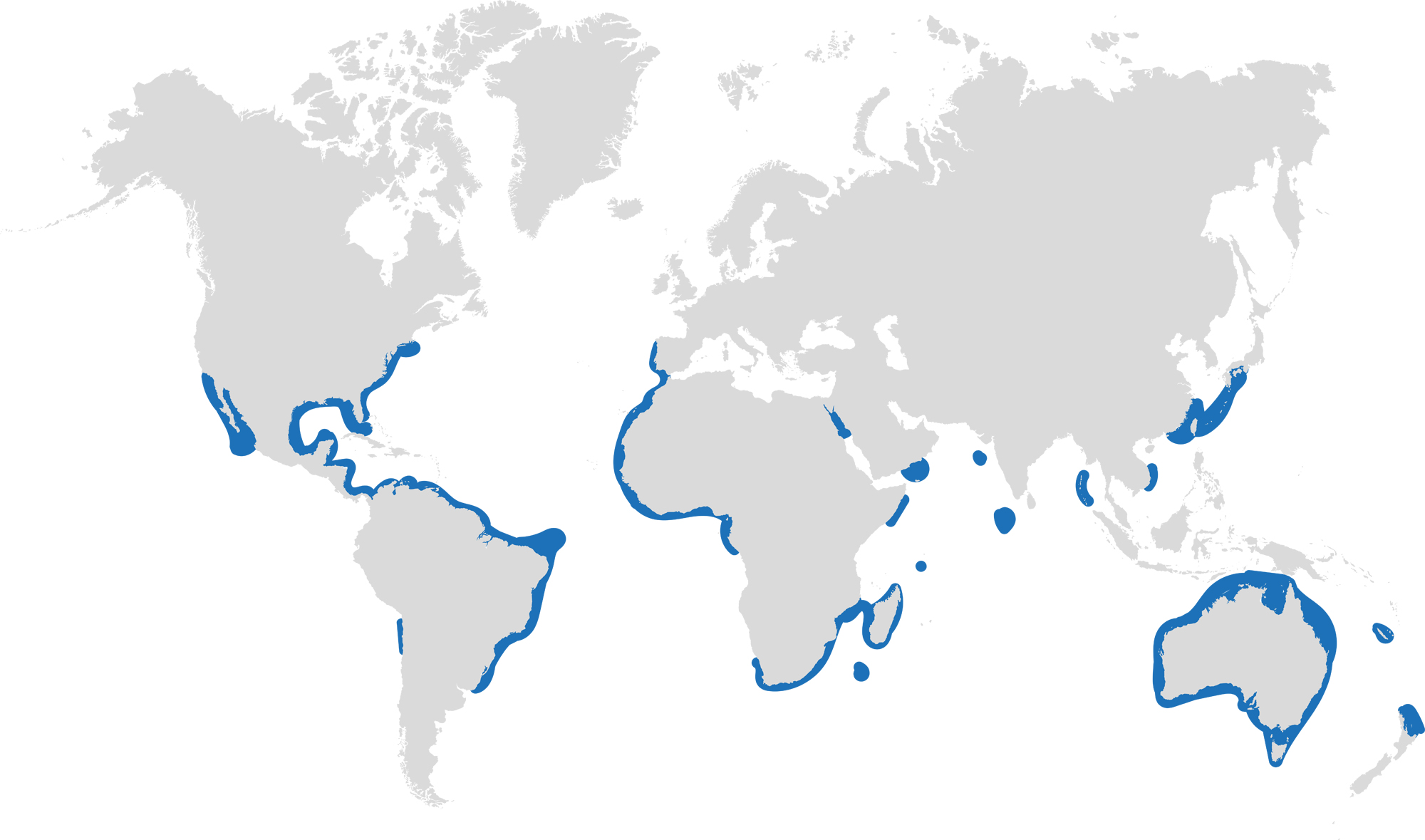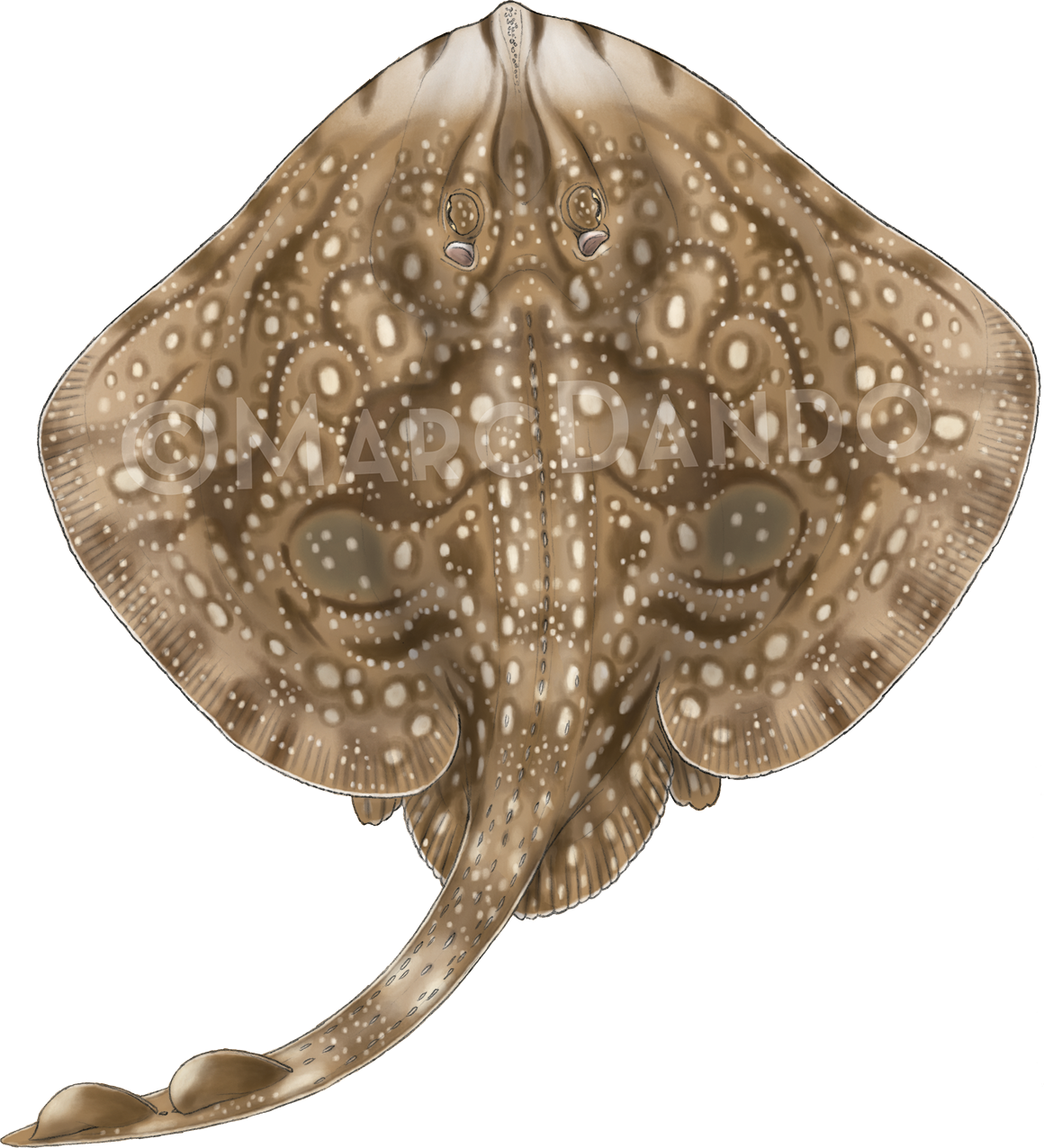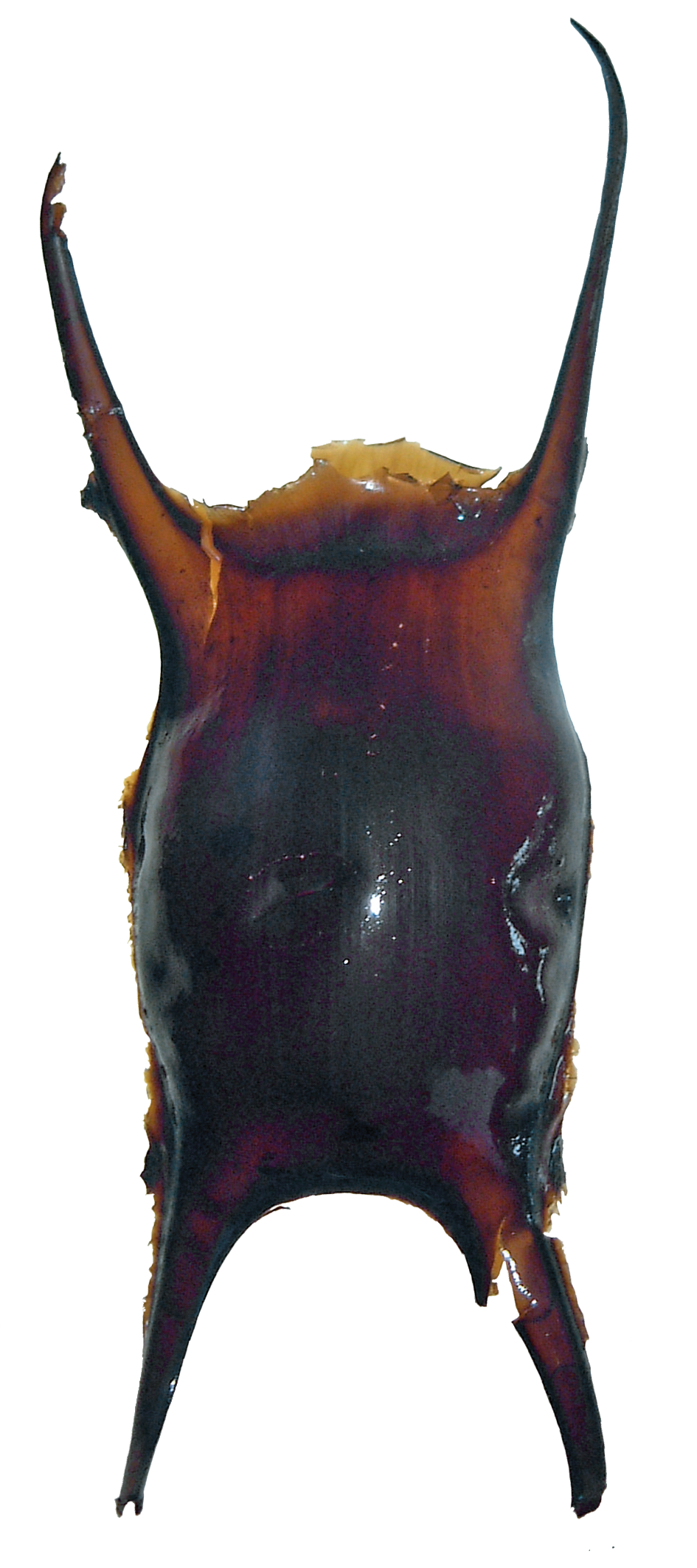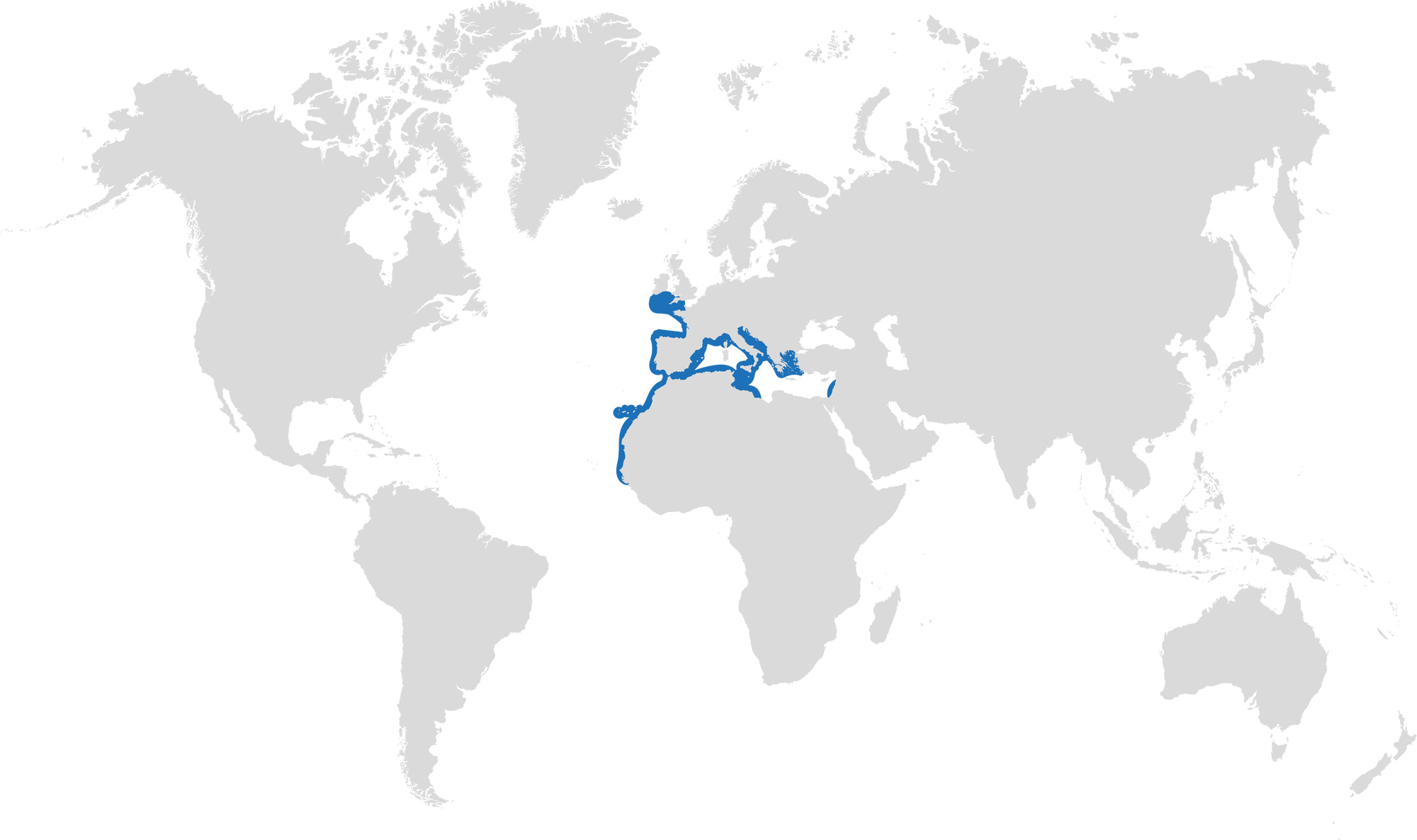Marine Life & Conservation Blogs
The importance of Sharks in our Ocean – more than just Awesomeness!

By: Cris Merz
Apex Predators – that is what they are. Often the baddies in movies, whether it is terrorizing a peaceful beach, swinging about in tornados killing people in landlocked towns or eliminating the English spy with “lasers” on their foreheads.
They have the notoriety of being tough, relentless, and a powerful killing machine. Unfortunately, they are the victim of a reputation that labels them as mean, vicious and unforgiving. Like most endangered species, they have also become trophies to many hunters. Shark fishing competitions are held all over the globe. NBC Sports even had a program dedicated to the competitive fishing of sharks.
The fact is, they need love, more than anything.
Population Decline
According to SharkSavers.org, about 1/3 of all sharks are threatened with extinction. 80% of ocean shark species are at risk from high seas fisheries. Because of the exposure that sharks have to these high seas fisheries using such fishing arts such as long-line, shark populations of hammerheads, silky, oceanic, mako and tigersharks in areas that once had a healthy population are experiencing declines of up to 90%. The fact that sharks have a very low reproductive cycle and often reach maturity as long as 33 years in the case of many females, overfishing has a huge impact on populations.
The population of sharks is greatly affected by industrial fishing. WildAid estimated that approximately 100 million sharks are killed each year. 73 million for the purpose of shark fin soup.
Shark Fins and Soup
Shark fin soup became a delicacy one thousand years ago, in the Sung Dynasty. Currently, it has become a symbol of prosperity and wealth. The sad part about all this – is that it is tasteless. The shark fin itself adds the rubbery texture to the dish but it does nothing for the taste. As a matter of fact – the only real flavor to the soup is the essence of chicken because that is what it is, chicken broth.
As a dish that usually goes for $95 a bowl but all the way up to over $100 depending on your location, it is usually reserved for grand occasions like high profile business lunches or wedding parties. Though an unsustainable fishing practice, those that speak on behalf of shark fin soup claim that bans are culturally discriminatory. Over the last five years, more and more awareness has been spread through campaigning and social media to encourage consumers to not only boycott places that serve soup, but to also boycott airlines and carriers that ship them. A huge victory for sharks was when Air China banned the cargo of shark fin soup joining 36 other carriers. And while the likes of UPS and DHL have banned cargo containing shark fin back in 2015, FedEx has still to commit claiming that what they do is “legal.”
The Importance of Sharks in Our Ocean
Besides the awesomeness that it is diving side-by-side with a school of hammerheads, or snorkeling next to a 40 ft whale shark gulping on plankton with an open mouth that could swallow you whole, it is very good for tourism. There are so many destinations that have become “must see” bucket list places for divers. Coco, Socorro Islands, Galapagos Isla Mujeres are all destinations that offer high impact diving or snorkeling that allows divers to experience some very close encounters with these apex creatures. However, it is not the sustainable industry of tourism that makes sharks important to planet earth, although it is a favorable argument when trying to not only enact laws but also enforce them in many marine reserves that are shredded daily by illegal fishing, it is important to the ocean itself as an ecosystem. To quote the famous line from underwater awareness guru and Jedi Master Obi Wan “Ben” Kenobi, “It brings balance to the Force”.
Bringing Balance to the Ocean
Sharks are top of the food chain. As an apex predator, they keep other populations in check. By being extremely effective in their feeding habits, sharks often feast on the old or sick grooming the populations of predators that may be directly beneath them. Eliminating them from the food chain would cause a potential devastation to other species that share the habitat with sharks. Their role in the ocean heavily affects the general health of the population as well and maintaining a diversity by keeping other predator’s populations in check. Removal of sharks could also change hunting habits as well as feeding habits of other species that could influence seagrass, corals as well as the collapse of other fisheries.
“One study in the U.S. indicates that the elimination of sharks resulted in the destruction of the shellfish industry in waters off the mid-Atlantic states of the United States, due to the unchecked population growth of cow-nose rays, whose mainstay is scallops. Other studies in Belize have shown reef systems falling into extreme decline when the sharks have been overfished, destroying an entire ecosystem. The downstream effects are frightening: the spike in grouper population (thanks to the elimination of sharks) resulted in a decimation of the parrotfish population, who could no longer perform their important role: keeping the coral algae-free and therefore reducing the oxygen quantities in our atmosphere. The knock on effects of this could be devastating for all life on Earth.” https://www.seashepherd.org.au/apex-harmony/overview/shark-importance.html
What Can I Do To Help?
People often ask; what can we do to help? I am just a person?
- First and foremost, do not buy food containing shark fin.
- Always opt for environmental and sustainable alternatives and substitutes. It isn’t just about the shark meat. Shark cartilage and oils are found in a range of products from beauty items to health nutrition. By boycotting shark products, you will reduce market demand.
- Contact your elected officials asking them what steps they are taking to end the unregulated trade in shark fins. Let your legislators know that sharks are important to you. Ask them to introduce and support legislation that will list sharks as protected species. This has helped in many cities across the globe forcing restaurants to take shark fin soup off the menu.
- Stay current through social media and other publications to see what is being done and how you can help, whether it is just by taking a pledge or sharing it with your friends. Tell your friends and relatives that they may be contributing to the irreversible decline of shark populations.
Speak out when you see abuse. This can mean anything from molesting sharks during a dive or fishing for them illegally
- Stay informed and share. Learn how different human activities put sharks at risk. By educating yourself on the issues, you can find effective ways to help by speaking at local clubs, schools and other local venues that might create awareness. By understanding the issues, you can teach others about sharks and inspire them to get involved as well.
- Reduce Your Seafood Consumption. No one likes to hear this. Unfortunately, commercial fishing impacts the sharks negatively in more than one way. Besides reducing their own source of food, sharks are themselves a byproduct of commercial fishing.
To find out more about International Training, visit www.tdisdi.com.

Marine Life & Conservation Blogs
Creature Feature: Dusky Shark

 In this series, the Shark Trust will be sharing amazing facts about different species of sharks and what you can do to help protect them.
In this series, the Shark Trust will be sharing amazing facts about different species of sharks and what you can do to help protect them.
This month we’re taking a look at the Dusky Shark, a highly migratory species with a particularly slow growth rate and late age at maturity.
Dusky sharks are one of the largest species within the Carcharhinus genus, generally measuring 3 metres total length but able to reach up to 4.2 metres. They are grey to grey-brown on their dorsal side and their fins usually have dusky margins, with the darkest tips on the caudal fin.
Dusky Sharks can often be confused with other species of the Carcharhinus genus, particularly the Galapagos Shark (Carcharhinus galapagensis). They have very similar external morphology, so it can be easier to ID to species level by taking location into account as the two species occupy very different ecological niches – Galapagos Sharks prefer offshore seamounts and islets, whilst duskies prefer continental margins.
Hybridisation:
A 2019 study found that Dusky Sharks are hybridising with Galapagos Sharks on the Eastern Tropical Pacific (Pazmiño et al., 2019). Hybridisation is when an animal breeds with an individual of another species to produce offspring (a hybrid). Hybrids are often infertile, but this study found that the hybrids were able to produce second generation hybrids!
Long distance swimmers:
Dusky sharks are highly mobile species, undertaking long migrations to stay in warm waters throughout the winter. In the Northern Hemisphere, they head towards the poles in the summer and return southwards towards the equator in winter. The longest distance recorded was 2000 nautical miles!
Very slow to mature and reproduce:
The Dusky Shark are both targeted and caught as bycatch globally. We already know that elasmobranchs are inherently slow reproducers which means that they are heavily impacted by overfishing; it takes them so long to recover that they cannot keep up with the rate at which they are being fished. Dusky Sharks are particularly slow to reproduce – females are only ready to start breeding at roughly 20 years old, their gestation periods can last up to 22 months, and they only give birth every two to three years. This makes duskies one of the most vulnerable of all shark species.
The Dusky Shark is now listed on Appendix II of the Convention on the Conservation of Migratory Species (CMS), but further action is required to protect this important species.
Scientific Name: Carcharhinus obscurus
Family: Carcharhinidae
Maximum Size: 420cm (Total Length)
Diet: Bony fishes, cephalopods, can also eat crustaceans, and small sharks, skates and rays
Distribution: Patchy distribution in tropical and warm temperate seas; Atlantic, Indo-Pacific and Mediterranean.
Habitat: Ranges from inshore waters out to the edge of the continental shelf.
Conservation status: Endangered.
For more great shark information and conservation visit the Shark Trust Website
Images: Andy Murch
Diana A. Pazmiño, Lynne van Herderden, Colin A. Simpfendorfer, Claudia Junge, Stephen C. Donnellan, E. Mauricio Hoyos-Padilla, Clinton A.J. Duffy, Charlie Huveneers, Bronwyn M. Gillanders, Paul A. Butcher, Gregory E. Maes. (2019). Introgressive hybridisation between two widespread sharks in the east Pacific region, Molecular Phylogenetics and Evolution 136(119-127), https://doi.org/10.1016/j.ympev.2019.04.013.
Marine Life & Conservation Blogs
Creature Feature: Undulate Ray
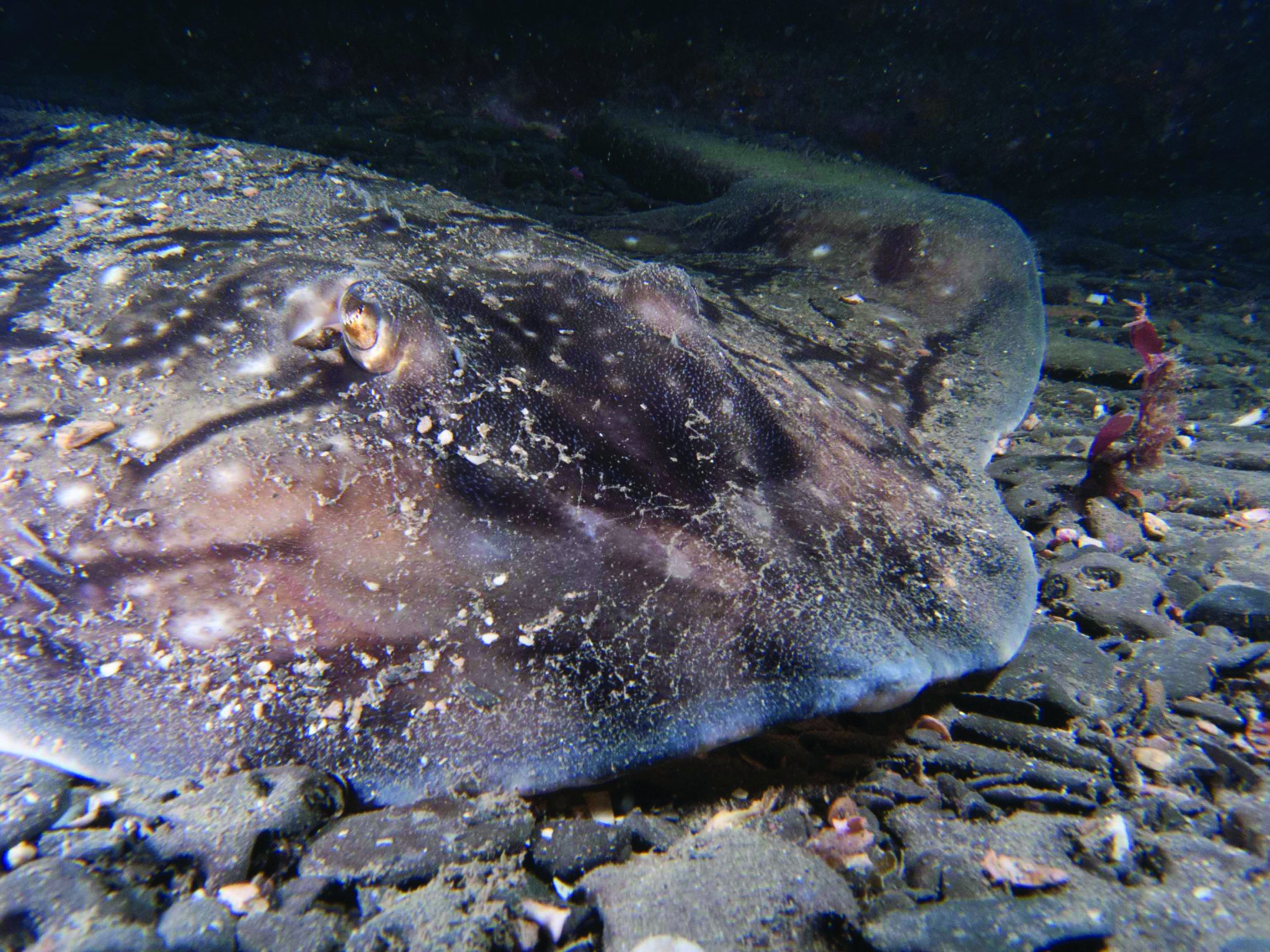
 In this series, the Shark Trust will be sharing amazing facts about different species of sharks and what you can do to help protect them.
In this series, the Shark Trust will be sharing amazing facts about different species of sharks and what you can do to help protect them.
This month we’re looking at the Undulate Ray. Easily identified by its beautiful, ornate pattern, the Undulate Ray gets its name from the undulating patterns of lines and spots on its dorsal side.
This skate is usually found on sandy or muddy sea floors, down to about 200 m deep, although it is more commonly found shallower. They can grow up to 90 cm total length. Depending on the size of the individual, their diet can range from shrimps to crabs.
Although sometimes called the Undulate Ray, this is actually a species of skate, meaning that, as all true skates do, they lay eggs. The eggs are contained in keratin eggcases – the same material that our hair and nails are made up of! These eggcases are also commonly called mermaid’s purses and can be found washed up on beaches all around the UK. If you find one, be sure to take a picture and upload your find to the Great Eggcase Hunt – the Shark Trust’s flagship citizen science project.
It is worth noting that on the south coasts, these eggcases can be confused with those of the Spotted Ray, especially as they look very similar and the ranges overlap, so we sometimes informally refer to them as ‘Spundulates’.
Scientific Name: Raja undulata
Family: Rajidae
Maximum Size: 90cm (total length)
Diet: shrimps and crabs
Distribution: found around the eastern Atlantic and in the Mediterranean Sea.
Habitat: shelf waters down to 200m deep.
Conservation Status : As a commercially exploited species, the Undulate Ray is a recovering species in some areas. The good thing is that they have some of the most comprehensive management measures of almost any elasmobranch species, with both minimum and maximum landing sizes as well as a closed season. Additionally, targeting is entirely prohibited in some areas. They are also often caught as bycatch in various fisheries – in some areas they can be landed whilst in others they must be discarded.
IUCN Red List Status: Endangered
For more great shark information and conservation visit the Shark Trust Website
Image Credits: Banner – Sheila Openshaw; Illustration – Marc Dando
-

 News3 months ago
News3 months agoHone your underwater photography skills with Alphamarine Photography at Red Sea Diving Safari in March
-

 News3 months ago
News3 months agoCapturing Critters in Lembeh Underwater Photography Workshop 2024: Event Roundup
-

 Marine Life & Conservation Blogs3 months ago
Marine Life & Conservation Blogs3 months agoCreature Feature: Swell Sharks
-

 Blogs2 months ago
Blogs2 months agoMurex Resorts: Passport to Paradise!
-

 Blogs2 months ago
Blogs2 months agoDiver Discovering Whale Skeletons Beneath Ice Judged World’s Best Underwater Photograph
-

 Gear Reviews2 weeks ago
Gear Reviews2 weeks agoGEAR REVIEW – Revolutionising Diving Comfort: The Sharkskin T2 Chillproof Suit
-

 Marine Life & Conservation2 months ago
Marine Life & Conservation2 months agoSave the Manatee Club launches brand new webcams at Silver Springs State Park, Florida
-

 Gear Reviews3 months ago
Gear Reviews3 months agoGear Review: Oceanic+ Dive Housing for iPhone















